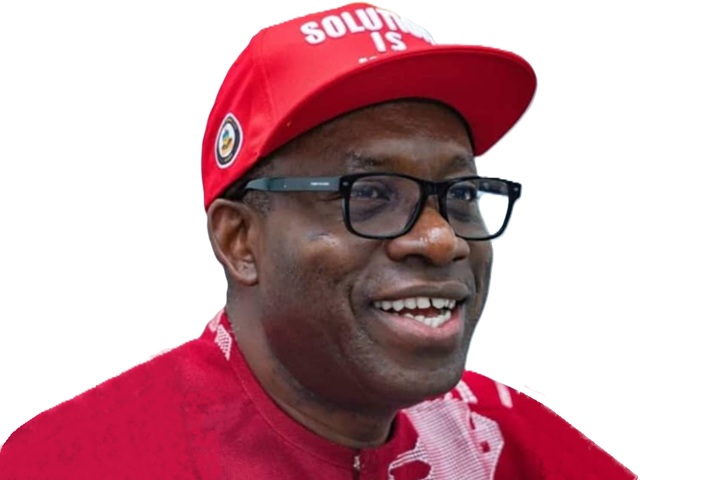Leadership, at its core, should inspire confidence, protect its people, and speak truth with responsibility. Yet, what we have seen from Governor Chukwuma Soludo, the supposed Chief Security Officer of Anambra State, is a glaring failure in all these areas. His recent reckless remarks about the Igbo people, made on foreign soil, are not just unfortunate; they are dangerous.
At a recent town hall meeting in Maryland, USA, Governor Soludo declared to the world that “99.99% of the criminals arrested in Anambra State are Igbo.” Not foreign insurgents. Not mercenaries. According to Soludo, Igbos are kidnapping and killing fellow Igbos. In his words, “Let’s stop the lies.” But whose lies, exactly?
Let’s be clear: nobody is above the law, and no ethnic group is free of crime. Criminals must be prosecuted, whether Igbo or not. But for a sitting governor; an Igbo son, no less; to travel abroad and speak in such broad, sweeping terms about his own people is nothing short of reckless. There is a place for truth, and a way to tell it. What Soludo did was neither.
What makes this worse is that his words, carelessly spoken, are already being weaponised against the Igbo community beyond Nigeria’s borders. In Ghana, a video now circulating widely shows a parliamentarian, Ayariga Hassan, echoing Soludo’s sentiments; only with more venom. He describes Igbo people in Ghana as a threat to the country’s sovereignty, unity, and territorial integrity. He accuses them of robbery, prostitution, kidnapping, and worse.
How did we get here?
When the Governor of Anambra State goes abroad and brands his own people as the face of criminality, what message does that send? It tells others: feel free to do the same. It gives the green light to xenophobes. It legitimises stereotypes. It puts Igbo lives in danger across the continent.
Let us be honest: Governor Soludo did not say these things in a security briefing or a closed-door meeting with law enforcement. He said them on stage, in public, in a foreign country, where global perception matters. That is not governance. That is political malpractice.
Meanwhile, what is happening at home? Anambra is bleeding. Kidnappings, robberies, daylight killings, the state has not known such sustained insecurity in recent memory. Under the present APGA-led administration, we have seen communities under siege, families torn apart, and businesses strangled by fear. The much-touted “Agụnechemba” security outfit has done little beyond uniforms and photo opportunities. There has been no meaningful support for the police, the army, or other federal security agencies operating in the state.
In short, while Soludo was abroad blaming Igbos for the insecurity at home, he has done very little to actually stop it.
And the hypocrisy is staggering. The International Society for Civil Liberties and Rule of Law (Intersociety) has released detailed findings contradicting Soludo’s assertions. They report the presence of foreign insurgents and mercenaries across multiple local government areas in Anambra State; from Awka South to Ayamelum, from Dunukofia to Orumba North and South. According to Intersociety, Soludo’s administration has not only failed to address this threat but has actively shielded these elements, choosing instead to point fingers elsewhere.
Why then is Soludo so eager to exonerate external actors and demonise his own people?
If the governor’s intention was to draw attention to the Igbo-on-Igbo violence plaguing the South-East, there were better ways; measured, sensitive, and constructive ways; to do it. Instead, he chose to make a blanket statement that paints millions of Igbos with the same brush. That is not just poor judgment; it is dangerous political rhetoric.
And the consequences are already here.
The likes of Ayariga Hassan, a politician in Ghana, is now using Soludo’s words to push anti-Igbo narratives. Today it is Ghana. Tomorrow, it could be South Africa, Kenya, or any other place where Igbos live and work. This is how dangerous rhetoric spreads. This is how hate is normalised. This is how lives are endangered.
Soludo’s job as governor is not just to manage the state’s finances or paint roads. He is the face of Anambra. When he speaks, the world listens. And what he says must be with care, with tact, and with a sense of responsibility, especially in these fragile times.
To shame your own people on foreign soil is not leadership. To downplay external threats at home while pointing fingers within is not strategy. To prioritise image over truth is not courage.
We need a governor who will defend the dignity of Anambra people everywhere, while firmly confronting insecurity at home. A governor who will engage foreign audiences with a message of hope, resilience, and unity, not despair and division.
As the 2025 elections draw near, Ndi Anambra must reflect deeply. Do we want another term of blame, division, and dangerous words? Or do we want leadership that builds, protects, and inspires?
Soludo has made his choice of running his people down.
Now, it’s time for Ndi Anambra to make theirs.
Enough of the recklessness. Enough of the shame. Enough of the conscienceless de-marketing. Anambra deserves better.







